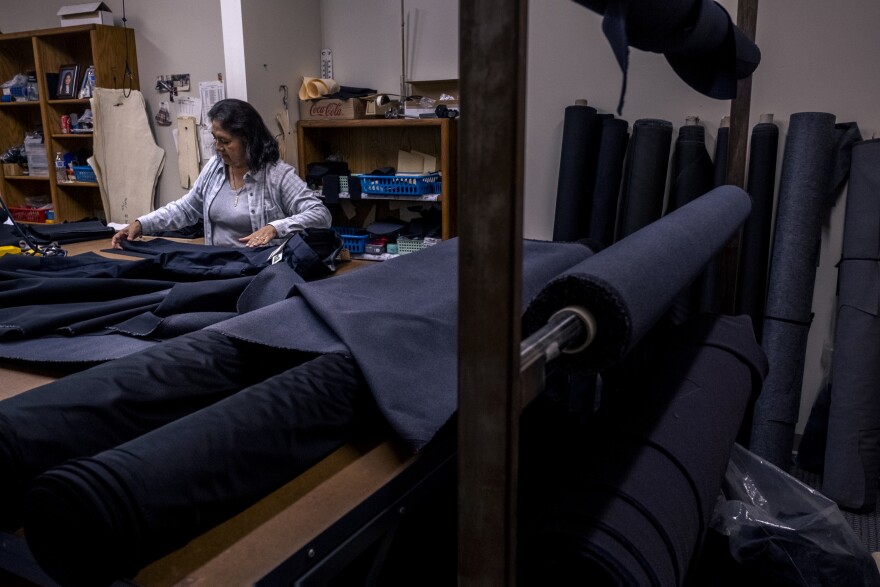Reyna Valdovinos uses a machine to carefully cut a piece of Kevlar mesh. This precisely measured piece of sturdy material will then be sewn into a pair of protective pants that are made to order, and could one day save their owner from serious injury.
Valdovinos is one of 14 workers who use similar care to make jackets, shirts and even boots at Motoport USA, an Escondido company that started out making gear for competitive motorcycle riders.
But in the '90s, company owner Wayne Boyer took note of what motorcycle police officers were wearing on the job.
"I was really shocked to see that there were just cotton polyester shirts and pants that had virtually no tear abrasion strength," Boyer said. "These guys were crashing and getting serious injuries from not wearing protective clothing."
Boyer knows the dangers of crashing as he used to be a motorcycle racer himself. "I have a lot of good friends that died racing motorcycles," he said.
Today, 75% of his business is making protective gear for motorcycle officers in more than 300 law enforcement agencies across the country.
The most recent customer for the family business is the San Diego Police Department.
San Diego motorcycle officer Matthew Zaitz proposed the uniform upgrade after doing a lot of research and talking to colleagues in other departments.
"I spoke to one of the officers who worked on Chula Vista Police Department," Zaitz said. "He went down at about 30 to 35 (mph), slid across the road, got up and the (Motoport pants he was wearing) weren’t torn, ripped, scratched ... they looked like he hadn't even been on the ground, so that’s what sold me."
It costs $3,100 to outfit an officer with several uniforms, including boots, but Motoport USA said those uniforms will last for years. The company is so confident about their Kevlar mesh suits that if they are damaged or tear when an officer crashes, it replaces the suit.
Zaitz said the change was long overdue. "I have pictures of the motor unit from the 1920s, and it was essentially the same uniform," he said. "So it’s very reassuring, knowing that we’re in a safer uniform — a uniform designed to be worn while riding a motorcycle."
And a uniform designed specifically for the officer who will wear it. Out-of-town customers submit their measurements online, but local customers come in to the shop.

Exact fit is crucial for protection, and there’s no mass production. Every uniform is made one at a time.
"We have (an) almost three and a half month wait when a police officer places an order," Boyer said. "So that’s one of our biggest problems, is supply and demand."
But Boyer said he would rather take his time and make sure things are done right. There was a time when he had other companies involved in the manufacturing — but then, one of those suits failed. A customer got hurt and sued.
"We found out that the (other) company ran out of thread, so they just grabbed the regular cotton poly thread," Boyer said.

"Regular" thread is not strong enough for the demand on these suits, which also need special stitching to make the seams strong, "so these police officers can hit the ground at 100 miles an hour and the gear doesn’t disintegrate," Boyer said.
Boyer said keeping all the work in-house lets them make sure everything is correct. And for workers like Valdovinos, it is a matter of pride. It makes her happy, she said, when she spots local folks and officers wearing what she makes with her own two hands.
"I’m so happy and I’m glad to make it, that kind of stuff for the people," she said. "That’s why I’ve stayed 30 years here."
Boyer is proud of a lot of things these days: his family, building his business in the county where he grew up, and a making a product that saves lives.
"We get about four (motorcycle officers) in a month that crash, and we usually get a testimonial from where they come in and shake my hand and thank me personally," he said. "I’ve even had wives and kids with the officers thank me many times, and it really does make me feel great."






